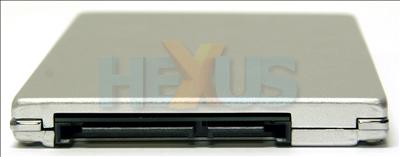The drive...something we've seen before?
The high-speed Crucial SSDs, dubbed M225, are available in three capacities. The vital stats are shown in the table, below.| Crucial M225 drive | 64GB | 128GB | 256GB |
|---|---|---|---|
| Read speed (up to) | 200MB/s | 250MB/s | 250MB/s |
| Write speed (up to) | 150MB/s |
190MB/s | 190MB/s |
| Drive buffer | 64MB | 64MB | 64MB |
| Etail price (20/08/09) | £115 |
£223 |
£405 |
| £ per GB | 1.797 |
1.742 |
1.58 |
Up until recently, purchasing a high-quality SSD intimated spending over £2 per GB of capacity. Crucial's triumvirate of drives all come in at comfortably below that figure. The 64GB drive is the slowest, reading and writing at 200MB/s/150MB/s, respectively, whilst the two larger-capacity models share slightly speedier credentials.
All share a 64MB drive buffer that gives some of the underlying technology away. A closer look at the drives' specification shows that they're powered by the Indilinx Barefoot controller and 64MB of on-drive cache as present on the OCZ Vertex, G.Skill Falcon, Corsair X-series, and Patriot's Torqx.
Indeed, swap any of those drives' stickers for this one and the end result is practically identical. Differences in performance will be based on firmware revisions rather than pure hardware changes.
A 2.5in form-factor is standard for consumer SSDs, and Crucial etails a 2.5in-to-3.5in adapter, for housing inside a regular chassis. Slowly but surely, case manufacturers are beginning to include dedicated 2.5in bays for SSDs.
Power and SATA connectors are ubiquitous.
The slimline profile - 100.2mm x 69.85mm x 9.5mm - means that the CT256M225 is eminently suitable for laptop usage, too.
Here's one side busted open. Note the Samsung MLC NAND chips. Opening up the drive further, you'd see the Indilinx controller and on-drive cache.
Crucial isn't bringing any new technology to the fore here. Rather, it's using internals that we've seen on numerous other drives before. Pricing, as we have commented, is keener, with each model around 10-20 per cent cheaper than the competition. Add in Crucial's excellent customer support and, on paper, it seems to be a winner. Let's now see how it benchmarks.














